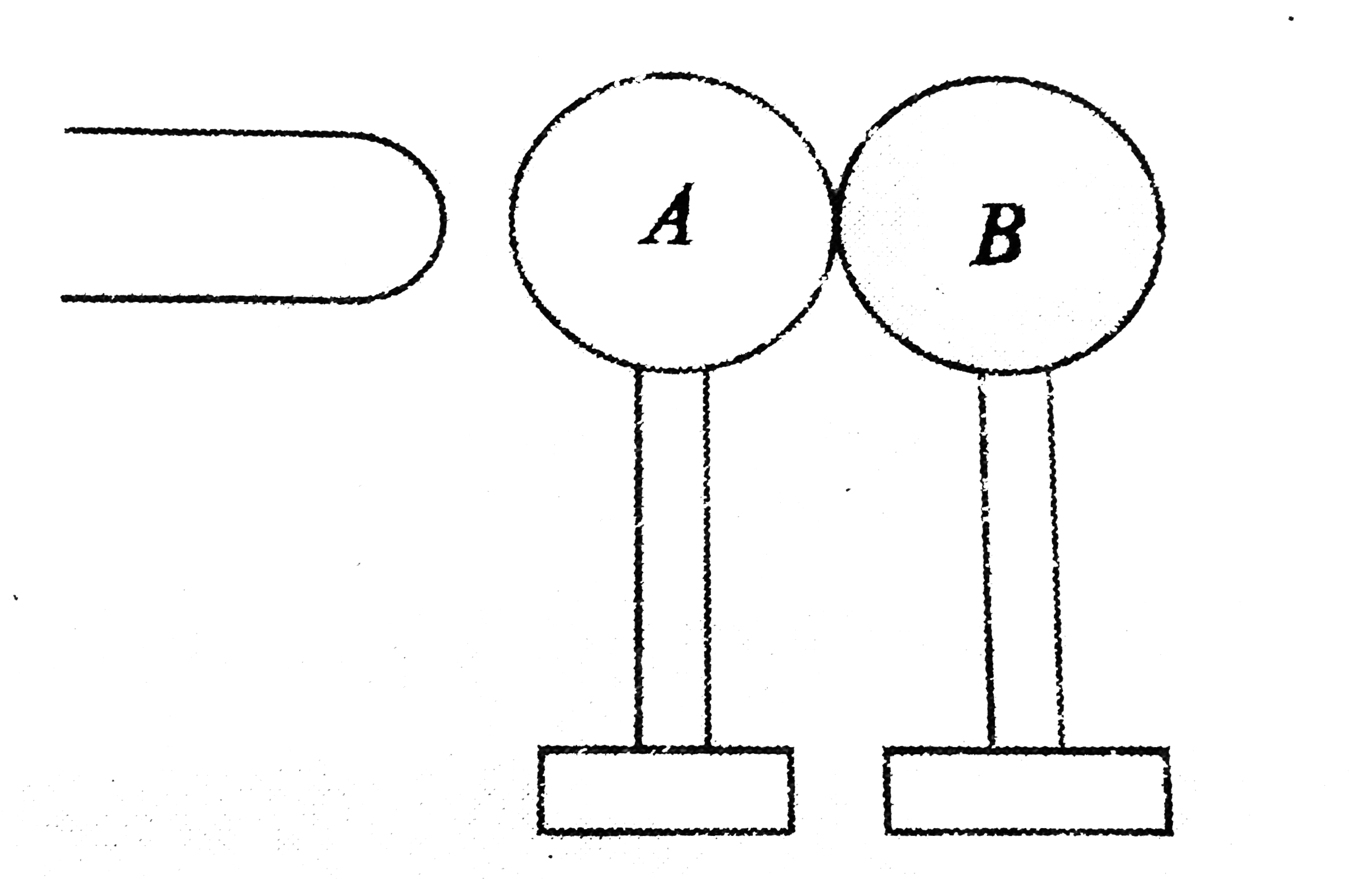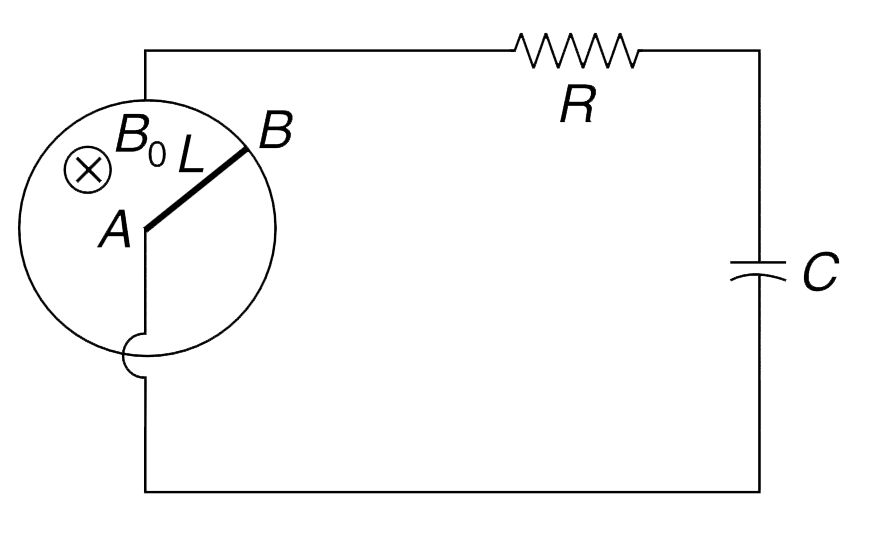Raghavan found a metallic rod AB and a glass rod CD both positively charged and placed on an insulat-ing table. He wanted to know what would happen to the charges on AB and CD if he touched both the rod at A and C ? Discuss.

Metals are conductors and glass is an insulator. If a person touches a charged body, the body loses to charge to ground and this is known as 'earthing'. In case of a metallic rod, charges are free to move through the body, and even if the person touches the body at 'A', the body loses its whole charge to the earth. Where as in case of glass rod, only the charge that is in contact with the person gets earthed and the remaining charge on 'CD' will remain as it is.
Topper's Solved these Questions
- BOOK - PEARSON IIT JEE FOUNDATIONCHAPTER - ElectricityEXERCISE - Level - III20videos
Electricity
- BOOK - PEARSON IIT JEE FOUNDATIONCHAPTER - ElectricityEXERCISE - Test 230videos
Electricity
- BOOK - PEARSON IIT JEE FOUNDATIONCHAPTER - ElectricityEXERCISE - Level - I86videos
Electricity
- BOOK - PEARSON IIT JEE FOUNDATIONCHAPTER - HEAT EXERCISE - Test 214videos
HEAT
Similar Questions
A positively charged glass rod is brought near an uncharged pith ball penduium. What happens to the pith ball ?
View SolutionFigure shows that a positively charged rod is brought near two ucharged metal spheres A and B clamped on insulated stands and palced in contact with each other.

(i) What would happen if the rod is removed before the spheres are separated?
(ii) Would the induced charges be equal in magnitude even if the spheres had different sizes or different conductors?
(iii) What will happen if the spheres are separated first and then the rod is rmoved far away?View Solution
Knowledge Check
- Question 1 - Select One
A positively charged glass rod is brought near an uncharged pith ball pendulum. What happens to the pith ball ?
AThe pith ball is repelled by the rodBThe pith ball is attracted towards the rod, touches it and then repelled.CThe pith ball show no change in positionDNone of these - Question 2 - Select One
What is the correct sequence of given steps to charge a body by conduction?
(A) Bring this positively charged glass rod in contact with a (neutral) uncharged metallic body, because of this the metallic body also becomes positively charged.
(B) Take a glass rod and rub it with silk cloth.
(C) Some electrons move from the glass rod to the silk cloth because of this the glass and becomes positively charged.AABCBBCACACBDBAC - Question 3 - Select One
What is the correct sequence of given steps to charge a body by conduction?
(A) Bring this positively charged glass rod in contact with a (neutral) uncharged metallic body, because of this the metallic body also becomes positively charged.
(B) Take a glass rod and rub it with silk cloth.
(C) Some electrons move from the glass rod to the silk cloth because of this the glass and becomes positively charged.AABCBBCACACBDBAC
A metal sphere is suspended from a nylon thread. Initially, the metal sphere is uncharged. When a positively charged glass rod is brought close to the metal sphere, the sphere is drawn towards the rod. But if the sphere touches the rod, it suddenly flies away from the rod. Explain, why the sphere is first attracted then repelled?
View SolutionA perfectly conducting ring of radius L is kept fixed on a horizontal surface. A vertical uniform magnetic field B0 exists in the region. A conducting rod (AB) of length L is hinged at the centre of the ring at A and its other end (B) touches the ring. The ring and the end A of the rod are connected to an external circuit having resistance R and capacitance C. The rod is made to rotate at a constant angular speed ω0. Neglect friction and self inductance of the circuit.
(i) Find work done by the external agent in rotating the rod by the time the capacitor acquires a charge q0.
(ii) Find heat generated in resistance R by the time the capacitor acquires a charge q0.
 View Solution
View SolutionTwo metallic sphere A and B kept on insulating stand are in contact with each other. A positively charged rod P is brought near the sphere A as shown in the figure. The two spheres are separated from each other , and the rod p is removed. What will be the nature of charges on sphere A and B ?
(##U_LIK_SP_PHY_XII_C01_E08_035_Q01.png" width="80%">View SolutionYou have just charged an electroscope by bringing a positively-charged glass rod near it. As a result, the leaves of the electroscope have moved apart. What will happen if you now bring a negatively-charged ebonite rod near the brass disc of the electroscope?
View SolutionA solid metallic sphere of radius a is surrounded by a conducting spherical shell of radius b(b>a). The solid sphere is given a charge Q. A student measures the potential at the surface of the solid sphere as V and the potential at the surface of spherical shell as Vb. After taking these readings, he decides . to put charge of −4Q on the shell. He then noted the readings of the potential of solid sphere and the shell and found that the potential difference is △V .
He then connected the outer spherical shell to the earth by a conducting wire and found that the charge on the outer surface of the shell as He then decides to remove the earthing connection from the shell and earthed the inner solid sphere. Connecting the inner sphere with the earth he observes the charge on the solid sphere as q2. He then wanted to check what happens if the two are connected by the conducting wire. So he removed the earthing connection and connected a conducting wire between the solid sphere and the spherical shelll. After the connections were made he found the charge on the outer shell as q3.
Potential difference (△CV) measured by the student between the inner solid shere and outer shell after putting a charge −4Q isView Solution

